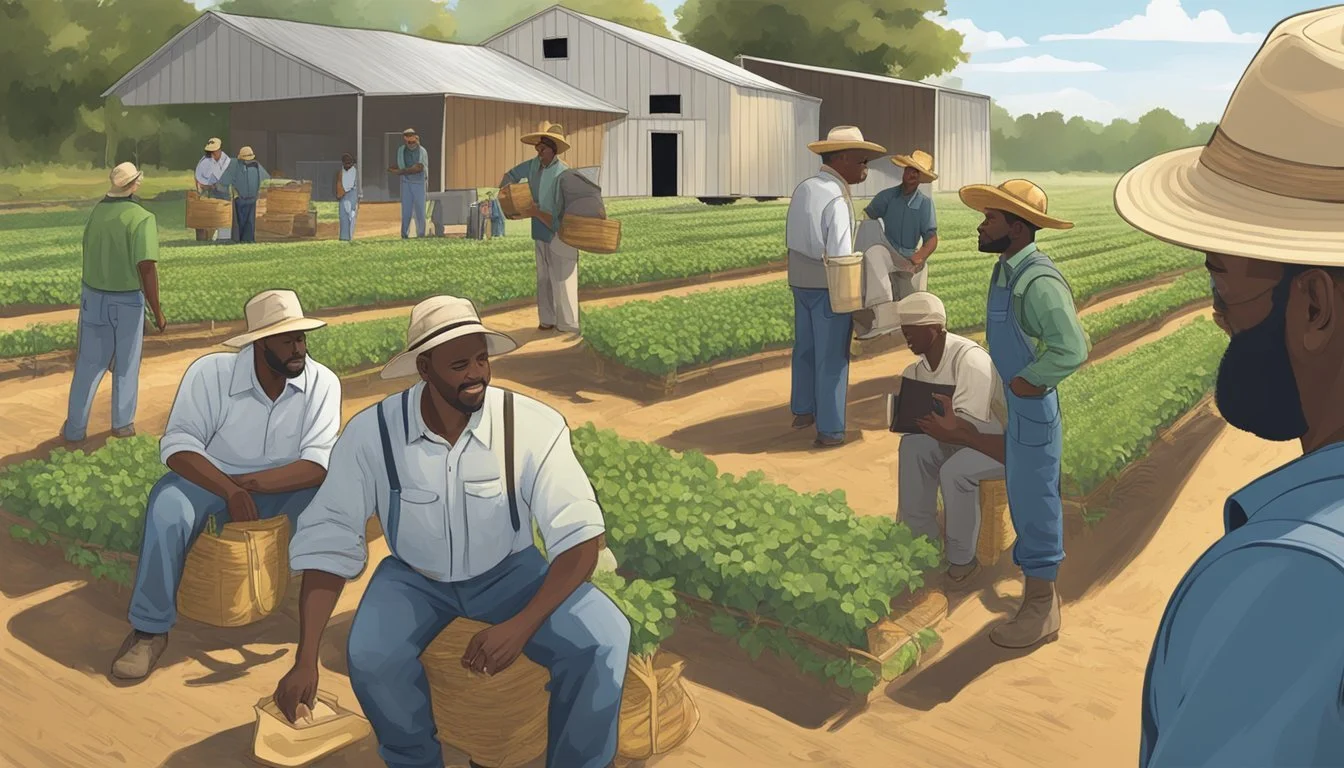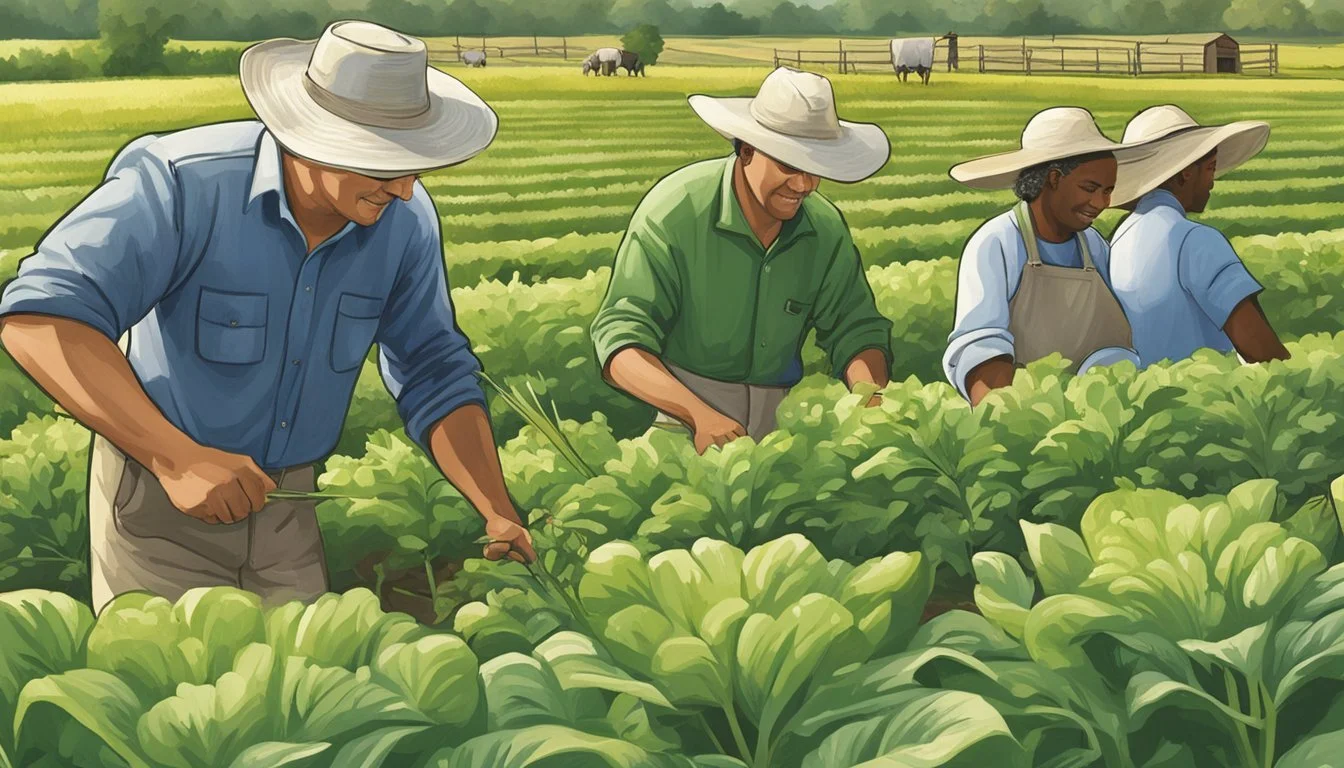Farming Grants Alabama
Opportunities and Application Guide
Alabama offers various farming grants and resources to support its agricultural sector. State, federal, and private funding are available to assist farmers with diverse projects, ranging from conservation efforts to the enhancement of specialty crops. The United States Department of Agriculture (USDA) plays a significant role by providing funds through initiatives like the Beginning Farmers and Ranchers Development Program and the Conservation Reserve Program (CRP). These programs aim to support new farmers and promote sustainable practices that safeguard the environment.
In recent years, such as 2022 and 2023, Alabama has seen continuous efforts to strengthen its farming communities through grants and educational support. The Alabama Cooperative Extension System, for instance, collaborates with various organizations to assist beginning farmers. Additionally, competitive grants, like those offered by the Alabama Department of Agriculture and Industries (ADAI) under the Specialty Crop Block Grant Program (SCBGP), support projects focused on improving the competitiveness of specialty crops. These initiatives are pivotal in maintaining Alabama's agricultural strength and fostering the growth of the industry in rural and economically distressed communities.
Understanding Farming Grants in Alabama
In Alabama, numerous grants are available to support the agricultural sector. These grants aim to empower farmers through funding and resources, enhancing the overall agricultural productivity and sustainability within the state.
Purpose of Farming Grants
The primary purpose of farming grants in Alabama is to assist beginning and established farmers in developing and expanding their operations. These grants are instrumental in:
Providing financial support to adopt innovative agricultural practices.
Enabling access to education and training for producers.
Encouraging sustainable farming and the growth of local food movements.
Supporting projects that add value to agricultural products and increase market potential.
Eligibility Criteria for Applicants
To participate in Alabama's farming grants programs, applicants must meet specific eligibility criteria. These often include:
Status: Being a new or established farmer in Alabama.
Collaboration: Working with local institutions, producer groups, or nonprofits.
Matching funds: Possessing the ability to match grant amounts with personal or alternative funds.
Eligibility may vary between programs, but typically prioritizes:
Nonprofit corporations, contributing to rural development.
Institutions of higher education, fostering agricultural innovation.
Individuals in rural areas, where economic development is crucial.
Applicants are assessed based on these criteria to ensure that grants are awarded to projects that align with the program's goals and have high potential for positive impact.
Beginning Farmer and Rancher Support
Alabama offers significant support through various programs to assist beginning farmers and ranchers, ensuring they have the necessary resources and knowledge to thrive in the agricultural sector.
Alabama Beginning Farmers Project
The Alabama Beginning Farmers Project operates with financial backing from the USDA Beginning Farmers and Ranchers Development Program, with grants awarded for the years 2015-04598 & 2018-02936. It focuses on statewide support for new farmers through partnerships with institutions, producer groups, and nonprofit organizations. The project aims to deliver comprehensive assistance, covering education, mentoring, and access to financial resources uniquely tailored to the needs of beginning farmers in Alabama.
USDA Beginning Farmers and Ranchers Development Program
The USDA Beginning Farmers and Ranchers Development Program (BFRDP) provides grants targeting organizations that offer education, mentoring, and technical assistance to the novice agricultural community. The USDA acknowledges the importance of replenishing the aging farmer population and, as such, earmarks funds specifically to aid individuals who have less than ten years of farming or ranching experience.
Military Veterans' Entry into Farming
Military veterans transitioning to civilian life have unique opportunities within the agricultural sector, especially in Alabama. Initiatives under the Alabama Beginning Farmers Project include specific provisions for military veterans, aiming at easing their entry into farming. Programs leverage veterans' discipline and skills, offering them a chance to cultivate a rewarding career in agriculture, backed by support systems designed to educate and guide them through the ins and the outs of the farming industry.
Grant Application Process
The grant application process in Alabama follows a strict protocol, guided by deadlines and specific submission guidelines. Applicants must adhere to these requirements to be considered for funding which may include grants up to $10,000.
How to Apply for Grants
To apply for farming grants in Alabama, applicants must typically complete an official application form provided by the grantor, such as the USDA Farm Service Agency or other state-led programs. The process may involve:
Thoroughly reading the grant announcement or program guidance
Collecting necessary documentation, including business plans or proof of farming status
Filling out the application with accurate and detailed information
Submitting the application through the specified method, whether online or via mail
Important Deadlines and Submission Guidelines
Application deadlines are crucial and vary by program. For example, a previous deadline for the Alabama Department of Agriculture and Industries grants was:
Application Deadline: April 12, 2022, 5:00 pm, Central Standard Time
Grant programs also stipulate clear submission guidelines, which include:
Following the exact format required (e.g., PDF submissions, specific forms)
Meeting eligibility criteria for rural areas if specified
Adhering to match funding or cost-share requirements
Applicants should confirm these details directly with the grant-providing agency or through their official announcements to ensure compliance and timely submission.
Educational Resources and Assistance
In Alabama, a variety of educational resources and support services are available to nascent farmers. These resources are designed to provide the foundational knowledge necessary to thrive in the agricultural sector. They encompass a range of materials and programs, including e-curriculum, third-party educational programs, and printed materials, ensuring that beginning farmers have access to a wealth of information.
Alabama Cooperative Extension System
The Alabama Cooperative Extension System (ACES) offers a comprehensive suite of resources aimed at beginning farmers. ACES collaborates with entities such as Crotovina and Farmscape Solutions to deliver science-based information, consultations, and e-curriculum materials to educate new producers. The system facilitates educational opportunities both online and offline, which include:
Workshops and seminars: Hands-on learning experiences addressing various aspects of farming.
Printed guides and publications: Essential reading materials covering good agricultural practices.
Technical Assistance Providers and Specialists
Technical assistance is crucial for farmers who are initiating their businesses. Alabama provides these services through a network of technical assistance providers and specialists. They are a key part of the support system, offering personalized consultations and advice on:
Farm management
Resource conservation
Specialists collaborate with organizations, such as the United Christian Community Association, to extend technical assistance to farmers. These services streamline the process of acquiring knowledge and applying it practically on the farm, leading to a stronger local food movement and enhanced agricultural practices.
Funding Opportunities and Financial Planning
In Alabama, a variety of grant programs are designed to support the agricultural sector. They underscore the necessity of financial planning for farm businesses seeking sustainability and growth.
Types of Grants Available
Planning Grants: Farmers looking to develop a business plan can apply for Planning Grants, with a maximum of $75,000 available. These grants facilitate the initial steps of creating a robust business strategy for agricultural endeavors.
Working Capital Grants: For more established farm businesses seeking to expand or improve their operations, Working Capital Grants offer more substantial funding, up to $250,000. They support projects that enhance the competitiveness of specialty crops, among other initiatives.
Cost Share Requirements: It is important for applicants to be aware that a matching fund requirement is usually in place, demanding a cost share match of 100 percent of the grant amount.
Here are some specific programs farmers in Alabama can consider:
Value Added Producer Grants: These cater to producers interested in value addition to their products, with a focus on planning and working capital projects.
Rural Cooperative Development Grant Program: This program specifically aids nonprofit corporations and institutions of higher education working on rural cooperative development, with a maximum grant amount of $200,000.
USDA Beginning Farmers Project: Grants from this project aid new farmers in starting their agricultural practices by providing essential funding and support.
Financial Management for Sustainability
Effective financial management is crucial in leveraging these grants to their full potential and ensuring the long-term viability of farm businesses. This involves meticulous planning and understanding of how to deploy funds to meet strategic business goals.
Creating a Business Plan is a foundational step for farmers to map out the future of their operations. This document should detail the farm's financial status, market analysis, and strategic vision, acting as a blueprint for growth and sustainability.
Farmers should also establish regular Financial Assessments to monitor the health of their farm business. This includes reviewing financial statements, cash flow, and ensuring that the grant funds have been invested according to the business strategy.
By harnessing these funding opportunities and employing judicious financial planning, Alabama's farmers can build more resilient and successful farm businesses.
Local Food Systems and Marketing
Alabama's agricultural sector is endowed with grants to support local food systems and enhance marketing opportunities. These funding opportunities aim to increase producer income through value-added activities, empowering the local food movement.
Value-Added Producer Grant
The Value-Added Producer Grant (VAPG) program is a pivotal resource for agricultural producers. It provides critical funding to enable producers to convert their raw products into value-added goods. This not only diversifies the market but also adds economic value. For instance, a farmer growing peaches can use the VAPG to fund the processing of peaches into artisanal peach jams, tapping into the local food movement's demand for specialty items.
Eligibility Criterion:
Independent Producers
Agricultural Producer Groups
Farmer or Rancher Cooperatives
Majority-Controlled Producer-Based Businesses
Permissible Use of Funds:
Planning Activities (e.g., Marketing and Business Plans)
Working Capital for Marketing Value-Added Agricultural Products
Exploring Marketing Opportunities
Producers are often in search of new channels to market and distribute their local foods effectively. Exploring marketing opportunities is not only about finding the right market but also about understanding and adapting to market demands. Efforts include engaging with local aggregators, processors, and distributors to ensure products reach consumers quickly and efficiently.
Key Considerations:
Consumer Trends
Distribution Channels
Market Research
Strategic Partnerships with Local Businesses
In Alabama, grants like those awarded under the Agricultural Marketing Service's Resilient Food Systems Infrastructure (RFSI) program help bridge the gap between local agricultural products and consumers. They support projects related to aggregation, processing, storage, and distribution, excluding meat and poultry. This aligns producers with relevant marketing opportunities and fosters resilience in local food systems.
Agricultural Techniques and Innovations
In the realm of agricultural advancements in Alabama, stakeholders are prioritizing sustainable practices and organic production to meet market demands and enhance competitiveness. These initiatives are fostering an environment where innovative farming techniques flourish and producers can leverage state and federal grants to adopt more efficient and eco-friendly practices.
Sustainable Farming and IPM
Sustainable agriculture in Alabama incorporates Integrated Pest Management (IPM)—a strategy that emphasizes the use of comprehensive information on the life cycles of pests and their interaction with the environment. This knowledge, in turn, facilitates optimized pest control decisions which are:
Economically viable
Safe for the environment
Beneficial for protection against competitors
Farmers employing IPM techniques focus on long-term prevention of pests or their damage by managing the ecosystem. Horticulture operations significantly benefit from IPM, often reducing the need for traditional chemical pesticides which can be harmful to the environment.
Organic Farming and Market Trends
Organic farming in Alabama is increasingly influenced by market trends that show a growing consumer preference for organically produced goods. The following points detail the core aspects:
Crop Production: Emphasis on soil health, minimal use of synthetic inputs
Pest Management: Utilization of natural pesticides and biological controls
Organic farmers in the state are tapping into the demand for clean, sustainable produce and are often able to compete favorably in the market due to consumer willingness to pay a premium for organic products. These farmers are not only contributing to a healthier environment but are also capitalizing on the sector's innovation to improve yields and profitability.
Collaboration and Networking
In Alabama, farming grants are supported by well-structured collaboration and networking activities that bring together a diverse range of stakeholders working towards the development of beginning farmers and the enhancement of existing agricultural practices.
Local Collaborations and Consultation
Local collaborations in Alabama involve a variety of stakeholders, including farmscape solutions and the United Christian Community Association (UCCA). They provide essential support networks for farmers. For instance, UCCA contributes to the regional agricultural scene by offering expertise and implementing programs in partnership with local farms. Consultations with these groups ensure that farmers have access to tailored information, techniques, and resources.
Farmscape Solutions: Assists with sustainable practice implementations and on-the-ground strategies.
UCCA: Engages in community outreach and educational program provision.
Networking with Statewide Agencies
Networking extends beyond local reach to include statewide agencies that foster industry growth and resource distribution. These agencies collaborate to build a statewide network that supports a robust agri-industry in Alabama. They offer educational resources, financial support through grants, and strategic advice.
State Agencies:
Alabama Cooperative Extension System: Delivers educational programs statewide.
Nonprofit Corporations and Higher Education Institutions: Receive funding to support rural cooperative development.
Networking with these entities ensures that Alabama's farmers are integrated into a broader community that enhances their capabilities and sustainability.
Policy, Regulation, and Impact
Grants and policies in Alabama aim to foster agricultural growth while complying with set regulations. They have direct effects on the success and sustainability of farms, particularly benefiting the state’s local economy.
Understanding Agricultural Regulations
In Alabama, agricultural grants are governed by regulations to ensure fair competition and to direct funds towards enhancing agricultural practices. One key example is the Specialty Crop Block Grant Program - Farm Bill (SCBGP-FB), which was amended by the Food, Conservation, and Energy Act of 2008. It demands a competitive grant process with a minimum award of $5,000.00. Moreover, compliance with such regulations is overseen by local entities, including the Alabama Department of Agriculture and Industries, ensuring that grantees contribute meaningfully to their counties and the state.
Programs such as the Alabama Beginning Farmer Program draw upon these regulations. They collaborate with organizations like the Alabama Cooperative Extension System and other partners to provide education and resources within the regulatory framework. This structure supports new farmers in establishing themselves in agricultural communities across Alabama.
Impact of Grants on Local Economy
Grants such as the Value Added Producer Grants offer a financial catalyst for Alabama's agricultural producers, including independent producers, producer groups, farmer cooperatives, and majority-controlled producer-based businesses. By doing so, they are fundamentally impacting the local economy by enabling producers to increase their market presence.
Entities like the USDA Farm Service Agency and Alabama Ag Credit also provide assistance and funding, playing crucial roles in the development and sustainment of agricultural activities within the state. By offering farm loan programs and services, they not only support individual farm success but also strengthen the rural economy.
The Rural Cooperative Development Grant Program disperses funds up to $200,000 to eligible institutions that, in turn, benefit rural areas—a testament to the substantial impact of grant schemes on local economies. Through the provision of grants and compliance with regulations, Alabama ensures that its agricultural sector not only thrives but also significantly bolsters the counties' economic statuses.
Agronomy and Environmental Management
Effective agronomy and environmental management in Alabama hinge on maintaining soil health and prioritizing wildlife conservation. These practices are crucial for sustainable farming and are supported by science-based information and research.
Soil Health and Crotovina
Soil health is pivotal for productive agronomy. One key element in Alabama's soil management includes the understanding of crotovina - underground channels created by burrowing animals, which can enhance soil quality. Research indicates that these natural structures contribute to soil aeration and water infiltration. Soil tests are recommended to determine nutrient management, guiding farmers in maintaining optimal soil conditions for crop production.
Wildlife Conservation
Wildlife conservation plays a significant role in Alabama's environmental management strategies. Efforts focus on creating habitats beneficial to both agriculture and wildlife. Practices such as field borders and conservation easements not only protect the environment but also promote biodiversity. These initiatives are critical as they align with the scientific consensus that robust ecosystems support healthier crops and sustainable agronomy.
Support for Specific Production Types
Alabama offers a variety of grant programs aimed at supporting the growth and sustainability of specialized crop production. These grants are instrumental in enhancing the state's agricultural profile, especially for new and socially disadvantaged farmers.
Fruit and Vegetable Production
The United States Department of Agriculture (USDA) provides the Specialty Crop Block Grant Program (SCBGP) to bolster the competitiveness of specialty crops, which include fruits and vegetables. In Alabama, the Department of Agriculture & Industries (ADAI) administers these grants, fostering initiatives that focus on marketing, research, pest management, and food safety.
Key Information for Contact:
Contact Person: Johnny Blackmon
Funding for fruit and vegetable production targets not only the enhancement of these products' quality and marketability but also aims to address challenges specific to the state's climate and soil conditions. Grants may cover a wide array of activities, from experimental crop trials to implementing innovative technologies for better crop management.










